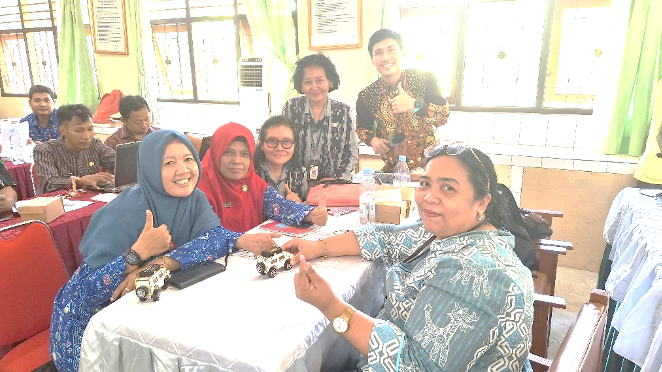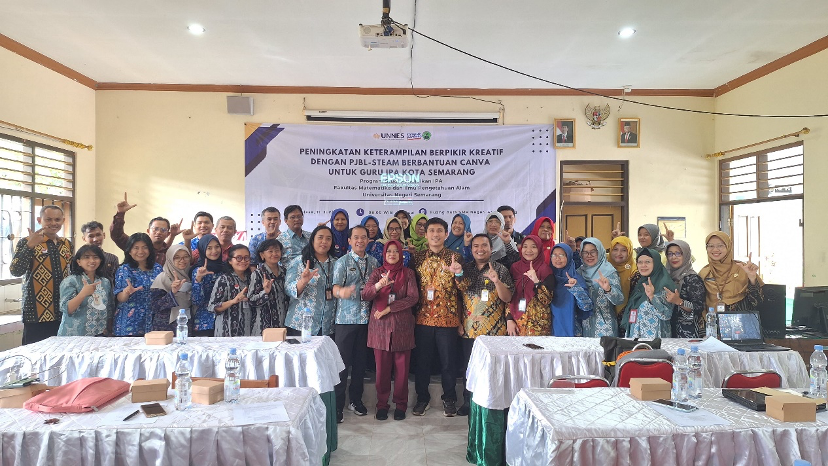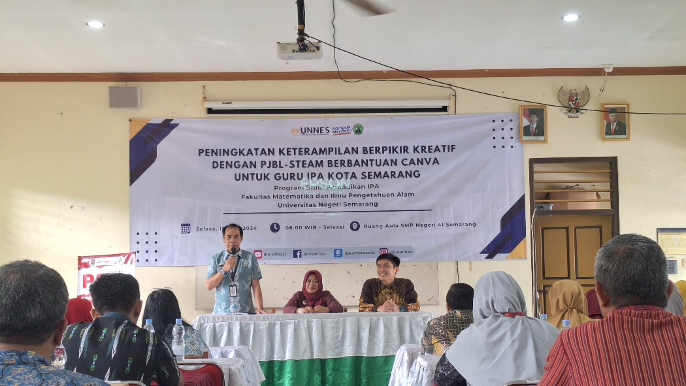The Semarang State University FMIPA Service Team successfully held PJBL-STEAM training assisted by Canva for Semarang City Science Teachers. The activity, which was carried out at SMP Negeri 41 Semarang, was attended by 40 teachers from various SMP Negeri Semarang City, Tuesday (11/6). The activity opened with the singing of the song Indonesia Raya, speeches by the Head of SMP Negeri 41 Semarang, Mrs. Ina Istiana, S.Pd., M.Pd, the Head of the Semarang City Science MGMP, Mr. Sukimin, M.Pd., and the Head of Community Service, Mr. Arif Widiyatmoko, Ph.D., and ended with a joint prayer.
The training was carried out by presenters from the Unnes FMIPA Service Team. They are Arif Widiyatmoko, Ph.D, Septiko Aji, M.Pd., Fidia Fibriana, Ph.D, Melissa Salma Darmawan, S.Pd, Alfiana Nur Rosita Mayanti, S.Pd, and Luky Hidayat. In this training, participants received material regarding Project based-learning (PJBL), Canva design, and implementing PjBL-STEAM in energy materials, then continued with designing digital posters on Canva related to STEAM projects, as well as direct practice of PJBL-STEAM projects with simple products . The projects produced by science teachers include wind generators, science cars, traffic light science, sweeping robots and solar panel cars.
“I thank the FMIPA UNNES service team for providing service in the form of PjBL-STEAM training with the help of Canva, we teachers are very enthusiastic about the material accompanied by direct practice so that it will be easier to understand the implementation of PJBL STEAM in science learning, including making digital posters using features in Canva,” said Sukimin, M.Pd as Chair of MGMP IPA Semarang City.
Teacher Anxiety
As a partner of FMIPA UNNES, MGMP IPA SMP Semarang City is not yet familiar with utilizing Canva’s features in detail. The Chair of the MGMP Science said that teachers currently still have limitations in creating PjBL-STEAM-based learning media and applying it to students when learning in the classroom. Alhamdulillah, Tuesday (11/6/2024) PjBL-STEAM training assisted by Canva was carried out for Semarang City Science Teachers. Participants were very enthusiastic about taking part in this activity. Exactly at 08.30 WIB the training started.
The resource persons tried to provide good explanations and provide direct practice regarding the use of features in the Canva media as well as the implementation of PjBL-STEAM in the classroom to improve creative thinking skills and train creativity. As reinforcement, the service team carried out PjBL-STEAM practices assisted by Canva by dividing science teachers into 8 groups. Practice in the form of designing science projects in the form of STEAM teaching aids. This project is closely related to the concept of energy in science lessons, especially on the topic of the energy crisis.
The speaker conveyed problems related to the energy crisis using a meter lighter and with the help of LKPD PjBL-STEAM media. Then the teacher and his group colleagues analyze the STEAM elements and design designs according to the topics that each group has obtained to solve problems related to energy materials. The teacher fills in the questions on the PjBL-STEAM LKPD. Then proceed with the practice of assembling a STEAM project according to the topic obtained. The teacher was very enthusiastic in assembling the STEAM project. When assembling the project, if there are obstacles, the FMIPA service team is ready to help in overcoming the difficulties experienced. Each group succeeded in creating a STEAM project. Then each group analyzed and presented the STEAM elements in the product and analyzed its relationship to the concept of energy.

PJBL-STEAM project practice “Science car”
“Training activities to improve creative thinking skills with PjBL-STEAM assisted by Canva can direct teachers to design learning that is interesting, contextual and relevant to the learning objectives of the independent curriculum and the P5 program. It is hoped that with this training teachers will be able to implement it in learning and guide students to take part in various competitions related to STEM, OPSI competitions, coding and robotics, as well as other competitions. “Apart from that, teachers are also expected to be able to design interesting STEAM learning on various other science topics that are in accordance with the characteristics of PjBL-STEAM learning,” said Arif Widiyatmoko, Ph.D as head of the service team.
To close the activity, a discussion and question and answer session was held for service participants regarding what innovations would be developed in the STEAM project. Then several participants conveyed their ideas well and critically about developing a STEAM project using alternative energy, so that it could overcome the problem of the energy crisis and be more environmentally friendly. Participants who successfully expressed their ideas were then given a solar panel car prototype as a form of appreciation. The training activity closed with a group photo session. We hope that this training activity will be useful for junior high school science teachers in Semarang City in implementing interesting learning that is appropriate to problems in everyday life so that they can improve creative thinking.

Photo of the FMIPA UNNES Service Team with MGMP IPA Semarang City


